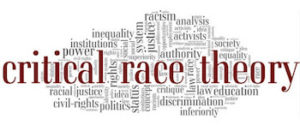
*Critical Race Theory (CRT) is affirmed on this date in 1971. This philosophical framework was developed to address issues of race, class, and gender.
In the 1970s, Derrick Bell, along with other legal scholars, began using Critical Race Theory (CRT) as a takeoff on "critical legal theory," a branch of legal scholarship that challenges the validity of concepts such as rationality, objective truth, and judicial neutrality. Critical legal theory was a takeoff on critical theory, a philosophical framework rooted in Marxist thought. Bell continued writing about critical race theory after accepting a teaching position at Harvard University. He worked alongside lawyers, activists, and legal scholars nationwide. His experience as a Black man and a civil rights attorney significantly influenced his legal scholarship. Bell resigned from his position at Harvard because of what he viewed as the university's discriminatory practices.
In the early 1980s, nonwhite students at Harvard Law School organized protests regarding Harvard's lack of racial diversity in the curriculum, among students, and in the faculty. These students supported Professor Bell, who left Harvard Law in 1980 and then became the dean at the University of Oregon School of Law. During his time at Harvard, Bell developed new courses that studied American law through a racial lens. Harvard students of color wanted faculty of color to teach the new classes in his absence. The university rejected student requests, responding that no sufficiently qualified black instructor existed.
Legal scholar Randall Kennedy writes that some students felt affronted by Harvard's choice to employ an "archetypal white liberal... in a way that precludes the development of black leadership". In response, numerous students, including Kimberlé Crenshaw and Mari Matsuda, boycotted and organized to develop an "Alternative Course" using Bell's Race, Racism, and American Law (1973, 1st edition) as a core text. Bell wrote in a narrative style and contributed to the intellectual discussions on race. According to Bell, his purpose in writing was to examine the racial issues within the context of their economic, social, and political dimensions from a legal standpoint.
Additionally, Bell's critical race theory was eventually expanded into more theories, each describing the hardships faced by specific groups, including AsianCrit (Asian), FemCrit (Women), LatCrit (Latino), TribalCrit (American Indian), and WhiteCrit (White). Bell's theories were based on the following propositions:
· First, racism is ordinary, not aberrational.
· Second, white-over-color ascendancy serves important purposes, both psychic and material, for the dominant group.
· Third ("social construction" thesis), race and races are products of social thought and relations.
· Fourth, the dominant society racializes different minority groups at different times in response to shifting needs, such as the labor market.
· Fifth, "intersectionality and anti-essentialism" thesis. No person has a single, easily stated, unitary identity. Everyone has potentially conflicting overlapping identities, loyalties, and allegiances. For example, a person with parents who have different religious views, political views, ethnicity, etc.
· Sixth ("voice-of-color" thesis), because of different histories and experiences from white counterparts, matters that white people are unlikely to know must be communicated to them by the racialized minorities.
CRT has also led to the study of microaggressions, Paradigmatic kinship, the historical origins and shifting paradigmatic vision of CRT, and how in-depth legal studies show that law serves the interests of the powerful groups in society. Microaggressions are subtle insults (verbal, nonverbal, and/or visual) directed toward people of color, often automatically or unconsciously.
For instance, in The Constitutional Contradiction, Bell argued that the framers of the Constitution chose the rewards of property over justice. Regarding the interest convergence, he maintained that "whites will promote racial advances for blacks only when they also promote white self-interest." Finally, in The Price of Racial Remedies, Bell argued that whites will not support civil rights policies that may threaten white social status.
Similar themes can be found in another well-known piece, "Who's Afraid of Critical Race Theory?" from 1995. Bell's 2002 book Ethical Ambition encourages ethical behavior, including "a good job well done, giving credit to others, standing up for what you believe in, voluntarily returning lost valuables, choosing what feels right over what might feel good right now." Other early practitioners of CRT are Richard Delgado, Charles Lawrence, Mari Matsuda, and Patricia Williams.